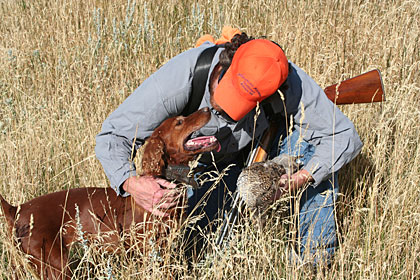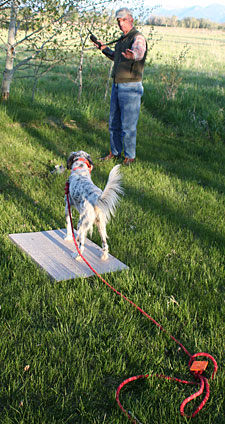Your dogs aren't perfect? Neither are mine...
By Dave Carty
 It's easier to overlook an infraction when you have a bird in hand, and crackerjack performers are usually cut a little more slack than mediocre plodders. |
Arizona, the final day of the Mearns quail season, 2008: Hanna and I are several hundred yards into the climb, the truck still in view on the two-track dirt road below us. Suddenly, I watch the little dog hesitate, ease into another tentative step and then freeze mid-stride, one leg folded under her chest, that glorious white tail reaching for the cool desert sun.
No small amount of training has gone into this three-year-old setter. Since part of my livelihood comes from writing about dogs, and since, ostensibly, I'm supposed to know what I'm doing, I have a professional interest in getting them to a certain level and keeping them there.
Ha.
Hanna's apparently rock-solid point is all for show. She cocks one ear back, gives me a sidelong glance and then dives nose-first into the covey. Birds blow out like shrapnel from an IED. They buzz up the mountain above me, over and through the mesquite and oaks, and behind them is Hanna, yipping like she's lost her mind, doing her best to run them to earth. For the next five minutes, all I see are flashes of white as she dashes through the trees, chasing one bird after the next. My whistles and screams have no effect whatsoever.


READ: Beeper Collar Training Tips


Finally, she tires of the game and comes trotting sheepishly back to me, promptly flushing a pair of birds that have been holding tight during the entire fiasco. And off she goes again.
I train just a couple new dogs each summer, but I have a stock phrase that I tell both dogs' owners: The best you can expect from any well-trained dog is that he will obey you 95 percent of the time. You can fudge that percentage up or down a little, but you can't do away with it entirely. To those who would accuse me of covering my butt, I plead guilty as charged. But the dog that never disobeys has yet to be born on this earth.
Why that is so is probably irrelevant, and more to the point, I really don't know. Even the best dogs seem to have to blow off their training once or twice a year, fully aware of the punishment that will follow. In fact, it is often the dogs with the most drive, the most desire and the most intelligence that are the worst offenders. Apparently, the visceral thrill of throwing off their shackles is just too much to resist. And it isn't just pointing dogs, either.
 "Generalizing" means training your dog to respond to the same command — in this case, "kennel"--in multiple locations. Without generalizing, the dog may obey in one place but not another. |
Ever attend a spaniel or retriever field trial? If you haven't, it's an eye-opening experience. A well-trained retriever or spaniel can do things that, from a pointing dog man's perspective, are just short of miraculous--multiple marked retrieves at obscene distances, rock-solid steadiness under intense pressure, the flawless execution of complicated hand signals. And yet, talk to any of the folks who have spent years training one of these animals, and they all have their stories: of the time their best dog broke and ran away, or decided to ignore a line, or chased a cat.
My own experience with spaniels is considerably more modest: I owned a springer 30 years ago and never really trialed it much. Even so, I'd put a lot of time into him and got him to where he was reliably steady to wing, shot and fall. It had taken years.
Then, one winter day, I was sitting in a duck blind on the Missouri River, waiting on a flock of mallards I'd called in to swing close enough for a shot. My spaniel Poke, who was sitting beside me, whined in anticipation. That was as far as it usually went; he knew the rules. When a drake cupped up just above us, I dropped it in the decoys.
Then all hell broke loose. Poke, who had been through this drill hundreds of times before, snapped. Rather than run three feet around the netting and willow blind I'd constructed, and ignoring my repeated commands to sit, he charged through the middle of the blind, towing 10 feet of netting, willow branches and debris into the water. He grabbed the duck and, still towing the netting around his neck, laboriously paddled back to shore. It was quite a performance.
Is there any way to correct for this type of behavior? I'll give you a politician's answer for that: yes and no. When you train a dog in a specific command in several different locations, it's called generalizing. The command doesn't change, but the location the command is given in does. This is crucial to building reliability in a dog's response to a command. Why? Because dogs assume that a command is specific to the area they received it.
 Hunting more than one dog at once can have a mutually corrupting effect on their response to commands. |
In other words, if you teach your dog to whoa in your backyard, it may assume that the same command given in your front yard--or in the field--is irrelevant. Generalizing teaches a dog that a command has to be followed no matter where it's given.
If you generalize every command you teach, you'll definitely lessen the number of disobeyed commands in the field and, over time, your
dog's percentage of obeyed commands will go up. But will it ever get much past 95 percent? Nope.
This is a tricky balancing act. How much slack should you cut your dog, knowing that perfection is never really possible? Is his disobedience an aberration, or is it the beginning of a downward slide to complete rebellion? These are questions I've struggled with for years and have no pat answers for.
My own uneasy acceptance of bad behavior in my dogs is considerably tempered by the individual dog's track record. By and large, good dogs get cut a little slack; chronic offenders may get none. Powder, my Brittany, for example, grew out of her rebellious stage years ago. She's been a model citizen ever since, happy to do what I ask of her and eager to please. But there's one flaw in her otherwise sterling character: She hates to back.
It's not like she's forgotten how to do it. She and I worked this out years ago, and when she knows I'm watching, she's content, if not always happy, to oblige. But remove me from the picture and it's a different story. She'll sidle up to a dog on point, make an elaborate charade of not having seen it, and then ease on past before locking up. If it didn't annoy me so much, it would be funny.
Lots of otherwise eager-to-please dogs have similar hitches in their repertoire. Last year, a really fine young setter I had in my kennel, a dog who did everything I asked of it and did it well, decided that retrieving was above and beyond her particular job description, and no amount of force-breaking could change her mind. I've had other dogs who would whoa but not recall on the whistle, several who would recall on the whistle but not whoa and a whole bunch who refused to heel.
 Repetitive drilling on "whoa" and other commands will reinforce obedience, but it won't guarantee perfection. |
In nearly every case I was able to work them through their sticking points, but later, on actual hunts, those problem areas would sometimes pop up again. One of my own setters, for instance, also shows a distinct disdain for retrieving. Hunted by herself, Scarlet will happily fetch everything I send her for, exactly as she's been trained. But hunt her with another dog and she's more than happy to let the other dog do the fetching chores. I'd rather she put a little more effort into it, but she's 10 years old and it just isn't worth the aggravation at this point to try to bring her around. So I put up with it.
Maybe I shouldn't. Is it worth the extra days and weeks of extended training to get a dog that much closer to perfection? For some, it undoubtedly is. But here's the deal: That kind of dedication is a lifelong commitment. My four dogs, three of which are trained to a fairly high level (the fourth is a puppy and has just begun training), are what most would consider well-trained animals. They whoa when they're told to whoa, retrieve what I send them to retrieve and come when they're called.


READ: Overcoming Gunshyness


At home, though, it's a different story. I turn my dogs out of the house or kennel several times a day to air them out, and it's not at all unusual for them to ignore me the first time I call them back. It's a little embarrassing; I'm supposed to be a professional.
Sure, I could slap a collar on them and give each of the little buggers a wake-up call, and when they get particularly cavalier about obeying commands, I do. But they've been through this drill before and are well aware of what a collar around their neck means.
So I put up with it, chalking it up to the 95 percent rule. And sure enough, their indifferent behavior at home rarely carries over into the field. Are they perfect? No way. But they're not bad, and I can live with that.






